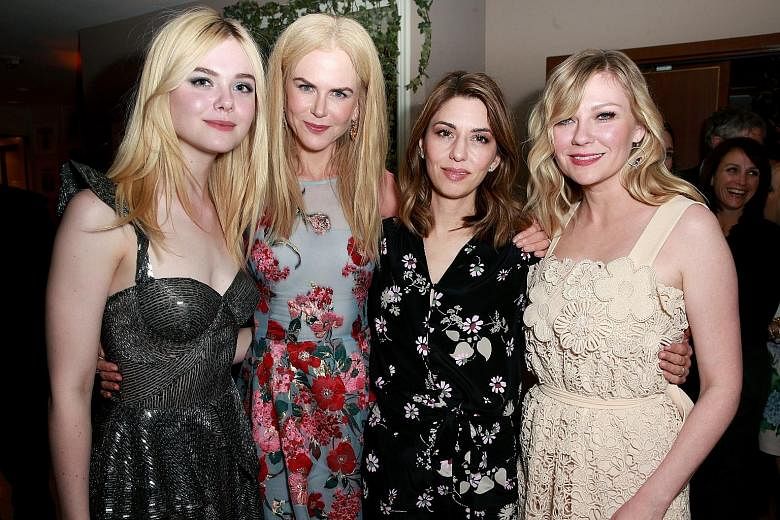LOS ANGELES • Weeks after her historic Best Director win for The Beguiled at the Cannes Film Festival, Sofia Coppola is facing backlash for her decision to omit people of colour from the Civil War drama.
Set in the Confederate South, the much-anticipated film centres on the inhabitants of an all-girls school who take in, and are later seduced by, an injured Union soldier.
The removal of two black characters from the original Thomas Cullinan novel - one of whom made it to Don Siegel's 1971 adaptation - was a conscious decision on the writerdirector's part.
"A lot of slaves had left at that time," Coppola, 46, told BuzzFeed News in a recent interview.
"I feel like you can't show everyone's perspective in a story."
Coppola's comments set social media ablaze, with a number of Twitter users pointing out the movie's lack of intersectionality.
In the interview, she describes The Beguiled as a feminist film which focuses on an isolated group of women, "all living together, all different ages with different stages of maturity".
It highlights the gender-based power dynamics of the Confederacy, but opts out of exploring the racial context.
Critics noted that it does not tell the whole story if black women are left out of the narrative, considering the role their labour played in the Southern social hierarchy at the time.
Coppola argues that including the black character from the 1971 adaptation, a slave named Hallie, would have been a misstep.
"I didn't want to brush over such an important topic in a light way.
"Young girls watch my films and this was not the depiction of an African-American character I would want to show them."
In the original film, Hallie, depicted on-screen by Mae Mercer, takes care of the Union soldier, played by Clint Eastwood, as he recovers.
Ira Madison III, a writer at The Daily Beast, considers Hallie to be a "token black character", one tasked with representing the hardships of slavery without being given an accurate, humanising story line.
He argues that from a present- day perspective, the portrayal of Hallie's character in the romanticised 1971 film is "incredibly offensive".
For the reasons Madison states, many defend Coppola's decision to leave Hallie out of her adaptation.
On Twitter, Madison suggested that it would be better to leave similar stories to black directors, who might have a stronger cultural connection to and understanding of the black characters' lives.
Coppola is known for romanticising the lives of white, often rich women. In the BuzzFeed interview, she noted that she is drawn to "characters whom I can relate to".
This "whitewashed" approach echoes that of Coppola's fifth feature, The Bling Ring (2013), which tells the real-life story of a group of teenagers who stole more than US$3 million worth of Hollywood celebrities' belongings.
One of the young women, according to Colorlines magazine, was a Latina teenager named Diana Tamayo who was left out of the movie, an action that went unnoticed by most.
But The Beguiled is held to a different standard, largely due to its historical setting.
The narrative relies on the existence of slavery as an institution, and critics such as BuzzFeed's Alison Willmore have deemed it "wilful blindness" to disregard the brutalities the black community faced.
Without context, some argue that the omission of black characters translates to erasure.
It is a notion that was brought up after the initial success of Damien Chazelle's La La Land (2016).
In a February column for The Hollywood Reporter, former basketball star Kareem Abdul-Jabbar focuses on the mission of Ryan Gosling's character, Sebastian, to revitalise traditional jazz.
It is not that Sebastian should have been played by a black actor, he argues, but rather that the movie's only prominent black character, a musician played by John Legend, should not have been portrayed as an antagonist.
"No, I don't think the film needs more black people," Abdul-Jabbar states. "Writer-director Damien Chazelle should tell the story as he sees fits, with whatever ethnic arrangement he desires.
"However, it is fair to question his colour wheel when it involves certain historical elements - such as jazz."
Coppola addressed critics in the BuzzFeed interview, saying she would be open to exploring different kinds of stories in the future.
"I would love to have a more racially diverse cast whenever I can," she said. "It didn't work for this story, but of course I'm very open to stories about many different experiences and points of view."
WASHINGTON POST
•The Beguiled opens in Singapore on July 13.

